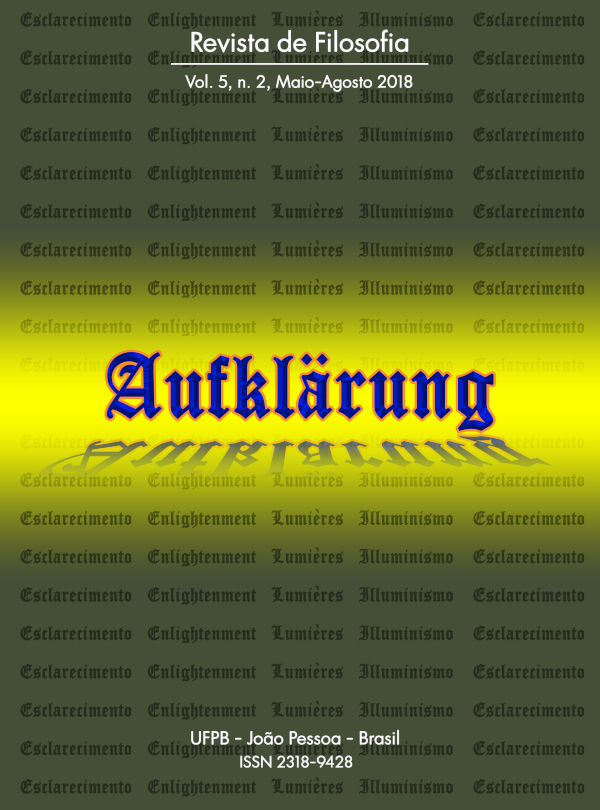Towards a Methodological Scheme-Interpretation
DOI:
https://doi.org/10.18012/arf.2016.41966Palavras-chave:
Schemas, perception, knowledge, neurology, psychologyResumo
Any kind of knowledge, cognition, perception, and action is necessarily shaped by (re)activation of "schemata". Any interpretation is schema (re)activation. Schemata are epistemologically speaking "structural" activation patterns which are psychologically and neurologically speaking accommodated, adapted, "learned" by (co- and re)activating neuronal assemblies. Six levels of interpretative schema activations (schema interpretations) are outlined from invariable primary "interpretations" through conventional, classificatory and justificatory as well as meta-interpretations. Constitutive schema interpretations are unavoidable. Many philosophical problems will have to be reformulated or reinterpreted along these lines.Downloads
Referências
ABEL, G., Interpretationswelten. Frankfurt/M.: Suhrkamp 1993.
GOFFMAN, E., Rahmen-Analyse. Frankfurt/M. 1977 (Orig. 1974).
KANT, I., Kritik der reinen Vernunft. 2. Auflage 1787. (KrV B) Hamburg: Meiner 1956.
LENK, H., Zu einem methodologischen Interpretationskonstruktionismus. In: Journal for General Philosophy of Science 22 (1991), 283-302.
LENK, H., Interpretationskonstrukte. Zur Kritik der interpretatorischen Vernunft. Frankfurt/M.: Suhrkamp, 1993.
LENK, H., Philosophie und Interpretation. Frankfurt/M.: Suhrkamp, 1993.
LENK, H., Toward a Systematic Interpretationism. In: Stapleton, T. J. (Ed.), The Question of Hermeneutics. Dordrecht: Kluwer, 1994, 79-88.
LENK, H., Interpretation und Realitaet. Frankfurt/M. 1995, Suhrkamp.
LENK, H., Schemaspiele. Frankfurt/M.: Suhrkamp 1995.
LENK, H., Das metainterpretierende Wesen. In: Allgemeine Zeitschrift für Philosophie 20.1 (1995a), 39-47.
LENK, H., Interpretationen und Impraegnationen. in: Simon, J. (Ed.), Orientierung in Zeichen. Frankfurt/M.: Suhrkamp 1997, 19-40.
MALSBURG, C. von der, Am I Thinking Assemblies? In: Palm, G. - Aertson, A. (Eds.), Brain Theory. Heidelberg/New York: Springer 1986, 161-176.
MILLIKAN, R. G., Language, Thought and Other Biological Categories. Cambridge MA: MIT, 1984.
MINSKY, M., Frame-System Theory. In: Schank, R. C. - Nash-Weber, B. L. (Eds.), Theoretical Issues in Natural Language Processing. 1975 (reprint MIT). Also in: Johnson-Laird, P. N. - Wason, P. C. (Eds.), Thinking. Cambridge 1977.
NEISSER, U., Cognitive Psychology. New York: Meredith 1966.
NEISSER, U., Cognition and Reality, N. Y. 1976.
RAKIC, P. - Singer, W. (Eds.), Neurobiology of Neocortex. In: Dahlem Workshop Reports. Chichester: Wiley, 1988.
ROTH, G., Kognition: die Entstehung von Bedeutung im Gehirn. In: Krohn, W. - Küppers, G. (Eds.), Emergenz: Die Entstehung von Ordnung, Organisation und Bedeutung. Frankfurt/M.: Suhrkamp 1992, 104-133.
RROTH, G., Das Gehirn und seine Wirklichkeit. Frankfurt/M.: Suhrkamp 1994.
RUMELHART, D. E., Schemata: The Building Blocks of Cognition. Center for Human Information Processing, University of California, San-Diego-La Jolla, quoted after CHIP-Report 79, 1978 (also in Spiro, R. - Bruce, B. - Brewer, W. (Hg.), Theoretical Issues in Reading Comprehension. Hillsdale NJ 1980).
SCHANK, R. C. - Abelson, R., Scripts, Plans, Goals, and Understanding. Hillsdale NJ: Earlbaum 1977.
SINGER, W. (Ed.), Gehirn und Kognition, Special Issue of Spektrum der Wissenschaft. Heidelberg 1990.
Arquivos adicionais
Publicado
Como Citar
Edição
Seção
Licença
Política de Direito Autoral para os itens publicados pela Revista:
1.Esta revista é regida por uma Licença da Creative Commons aplicada a revistas eletrônicas. Esta licença pode ser lida no link a seguir: Creative Commons Attribution 4.0 International (CC BY 4.0).
2.Consonante a essa politica, a revista declara que os autores são os detentores do copyright de seus artigos sem restrição, e podem depositar o pós-print de seus artigos em qualquer repositório ou site.
Política de Direito de Uso dos Metadados para informações contidas nos itens do repositório
1. Qualquer pessoa e/ou empresa pode acessar os metadados dos itens publicados gratuitamente e a qulquer tempo.
2.Os metadados podem ser usados sem licença prévia em qualquer meio, mesmo comercialmente, desde que seja oferecido um link para o OAI Identifier ou para o artigo que ele desceve, sob os termos da licença CC BY aplicada à revista.
Os autores que têm seus trabalhos publicados concordam que com todas as declarações e normas da Revista e assumem inteira responsabilidade pelas informações prestadas e ideias veiculadas em seus artigos, em conformidade com a Política de Boas Práticas da Revista.






































